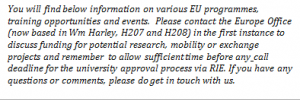The Europe Office Newsletter – August 2017 |
BREXIT & Events University to host series of events in relation to the EU and Brexit The first of these events will take place on Wednesday 23rd August and will be a panel discussion, allowing all members of staff to share their thoughts and ask any questions about the impact of Brexit on the university and it’s wider implications on the higher education sector. The event will be opened by our very own Mark Anderson, Director of the Europe Office, and a subsequent Q&A session will be chaired by the Principal and Vice-Chancellor Professor Pamela Gillies CBE FRSE. This event will take place from 1pm to 2pm in the Deeprose Lecture Theatre, Govan Mbeki building. We will be hosting a funding workshop on the morning of Tuesday 29th August in H112 (9am) to promote opportunities for funding through the Erasmus+ programme. This is a great opportunity for those of you who may be interested in gaining an insight into how these projects work and the processes involved, as we will have academics in attendance that are currently involved in projects sharing their own experiences. There will be a light lunch at 12:30pm where will be serving Ibérico ham thanks to Pablo Lopez Alonso! Following lunch, there will be an opportunity to have a one-to-one session with Mark Anderson and Pablo Lopez Alonso on a specific programme or about a potential project idea that you may have. Please contact r.blincow@gcu.ac.uk to book a place. People Services will also host an informal drop-in session from 3.30pm on Monday, 4th September in the Staff Social Space. This is aimed at those of you who are EU nationals who may wish to discuss the implications of Brexit. The session will last around 90 minutes and the University’s lawyers Anderson Strathern will provide an overview of the implications of the UK government’s proposed policy ‘Safeguarding the Position of EU Citizens Living in the UK and EU nationals Living in the EU’. There will also be a general discussion to identify what support and advice you would like from the University in the future.
Horizon 2020 CALLS The submission session is now available for 7 health related project proposals. These include:
More details of these calls and their deadlines can be found at here.
MSCA (Marie Skldowska Curie Actions) Deadlines for 2016/17 · MSCA IF (Individual Fellowships) 2016: Call Open 11/4/17; Deadline: 14/9/2017 · MSCA COFUND-2016: Call Open 5/4/17; Deadline: 28/9/2017
OTHER EU FUNDING Erasmus + 2017 Key Action 2 Deadlines for 2016/17 · Strategic partnerships in the field of youth; Deadline: 4/10/2017 All the deadlines and information on the types of activities you can apply for are contained in the 2017 Call for Proposals document and the 2017 Programme Guide both of which you can download from the Eramus+ Key Resources page. The Call for Proposals is an overview document containing all the deadlines for 2017, while the Programme Guide contains all the detailed information on how to apply for Erasmus+ funding. You will need to read both documents when planning an application.
Erasmus+ The first lists of projects across the UK funded under the Erasmus+ programme in 2017 have now been published. The lists provide an overview of projects funded under the 2017 Call, and you can see the types of organisations who have been successful in securing decentralised Erasmus+ funding. The information available includes the organisation name, address and country, the type of project that is being supported, the amount of funding in euros, and the project name. Follow this link to view the list.
CONTACTS AT GCU Mark Anderson, Mark.Anderson@gcu.ac.uk or x8842 Pablo Lopez Alonso, Pablo.LopezAlonso@gcu.ac.uk or x8337 Rhona Blincow, r.blincow@gcu.ac.uk or x3928 Rose Cawood, rose.cawood@gcu.ac.uk or x3749 Siobhan Doyle, Siobhan.Doyle2@gcu.ac.uk or x8274 |
Tag: Brexit
Newsletter January 2017
The Europe Office Newsletter – January 2017
EVENTS
21/02/17, GCU Conference Centre, 09.30am,
Scotland Europa Member’s Planning Meeting 2017-2018,
It is our pleasure to host the Scotland Europa Member’s Planning Meeting this year on our campus. The annual forward planning meeting is a chance for Scotland Europa’s membership to come together and plan their activities for the year ahead in the context of the changing landscape, and Scotland’s place in Europe. The discussion during the Members’ Planning Meeting for 2017-18 will centre around developing members’ approach after the EU referendum and how this directly relates to their membership activities and services. The main part of the meeting will be devoted to parallel round table discussions based on this.
BREXIT
Theresa May recently delivered a speech in which she detailed Britain’s broad objectives in forthcoming Brexit negotiations with the EU. Among her twelve objectives was a section discussing science and innovation. This is what she had to say on the matter:
“One of our great strengths as a nation is the breadth and depth of our academic and scientific communities, backed up by some of the world’s best universities. And we have a proud history of leading and supporting cutting-edge research and innovation. So we will also welcome agreement to continue to collaborate with our European partners on major science, research, and technology initiatives. From space exploration to clean energy to medical technologies, Britain will remain at the forefront of collective endeavours to better understand, and make better, the world in which we live.”
The Prime Minister also touched on the fact that although we will not be seeking membership of the single market, “there may be some specific European programmes in which we might want to participate”. She stated that if this was the case, that it was “reasonable that we should make an appropriate contribution.”
Universities UK provide more information and analysis on the impact of Brexit at the following link:-http://www.universitiesuk.ac.uk/policy-and-analysis/Pages/brexit-and-universities.aspx
HORIZON 2020
MSCA (Marie Skldowska Curie Actions) Deadlines for 2016/17
- MSCA IF (Individual Fellowships) 2016: Call Open 11/4/17; Deadline: 14/9/2017
- MSCA COFUND-2016: Call Open 5/4/17; Deadline: 28/9/2017
- MSCA RISE (Research and Innovation Staff Exchange) -2016: Call open 1/12/16; Deadline: 5/4/2017
Call for Proposals: Fuel Cells and Hydrogen 2 JU
The European Commission, Directorate-General for Research and Innovation, has just launched 2017’s Fuel Cells and Hydrogen 2 JU call for Proposals. This call is presented together with all the related activities under the 2017 work plan of the Fuel Cells and Hydrogen Joint Undertaking, FCH 2 JU.
This single-stage call has an estimated budget of EUR 116,000,000.
The deadline for submission of applications is 20 April 2017.
Further information on the call and the different topics is available at:
– Participant Portal H2020-JTI-FCH-2017-1
– Official Journal of the EU OJ CO15
Looking Beyond Horizon 2020
While Horizon 2020 is the main EU programme for funding research and innovation, there are also a number of other EU programmes which could be of interest to researchers looking for funding. These programmes are often characterised by lower funding levels and rates but often finance smaller scale projects which are harder to fit under the Horizon 2020 umbrella. The better known programmes include Erasmus+, COST and the Health Programme, but there might also be opportunities under Creative Europe, LIFE, in the area of Rights, Equality, Citizenship and Justice or the Research Fund for Coal and Steel. Finally, UKRO has also produced a short overview on the European Structural and Investment Fund.
Different policy Directorate Generals of the European Commission run these programmes, and while some efforts have been made to align funding rules more, there are still significant differences, for example in the application procedures or the rules for project management and reporting. Our UKRO Factsheets will provide you with the most important information on each scheme in a condensed format.
OTHER EU FUNDING
Erasmus + 2017 Key Action 2 Deadlines for 2016/17
- Strategic partnerships in the field of education and training; Deadline: 29/3/2017
- Strategic partnerships in the field of youth; Deadline:2/2/2017
- Strategic partnerships in the field of youth; Deadline: 26/4/2017
- Strategic partnerships in the field of youth; Deadline: 4/10/2017
- Knowledge Alliances; Deadline: 28/2/2017
- Capacity building in the field of higher education; Deadline: 9/2/2017
- Capacity building in the field of youth; Deadline: 8/3/2017
All the deadlines and information on the types of activities you can apply for are contained in the 2017 Call for Proposals document and the 2017 Programme Guide both of which you can download from the Eramus+ Key Resources page. The Call for Proposals is an overview document containing all the deadlines for 2017, while the Programme Guide contains all the detailed information on how to apply for Erasmus+ funding. You will need to read both documents when planning an application.
OTHER NEWS
The European Commission has published scoping papers for the Horizon 2020 work programmes 2018-2020. These papers outline the main priorities over the next three years for each part of Horizon 2020 and will form the basis for the development of the work programmes.
17 thematic scoping papers and one overarching document have been published. The scoping papers are working documents not formally endorsed by the Commission. The adoption and publication of the 2018-2020 work programme is expected in October 2017.
Contacts at GCU
Mark Anderson, Mark.Anderson@gcu.ac.uk or x8842
Pablo Lopez Alonso, Pablo.LopezAlonso@gcu.ac.uk or x8337
Rhona Blincow, r.blincow@gcu.ac.uk or x3928
Rose Cawood, rose.cawood@gcu.ac.uk or x3749
Siobhan Doyle, Siobhan.Doyle2@gcu.ac.uk or x8274
More Information:
HORIZON 2020 http://ec.europa.eu/research/participants/portal/desktop/en/home.html
ERASMUS PLUS http://ec.europa.eu/programmes/erasmus-plus/
Facebook https://www.facebook.com/TheEuropeOffice

